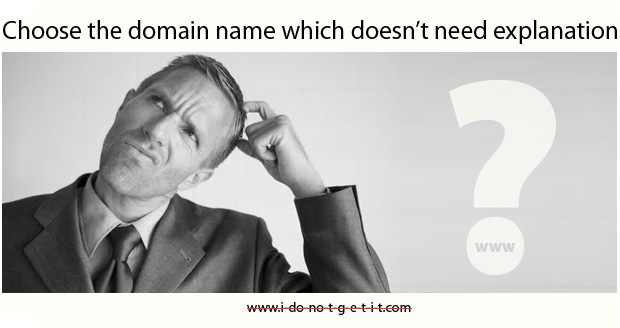
Your website name is the center of your Internet identity. So what type of things should you take into consideration when choosing the name that will represent you on the Web?
You basically have four options:
- Use your own name.
- Use a company name.
- Use a niche name.
- Use a project name.
Option #1: Use Your Own Name
More and more, people are distrustful of organisations. They are looking for human connection. They want a name, a face, values, and a style they can trust. From a social media perspective, people are more likely to interact with a face than an icon.
This is why this is the age of personal brands. That is by far my favorite option when it comes to building a platform. It’s the one that provides the most flexibility.
Over the years, your brand may change many times. But your web address will remain the same. This ensures that you take most (if not all) of your audience with you as your interests and activities change.
If you are just starting out, I suggest you start here. Secure a website name with your personal name or some variation of it. Yes, your name may already be taken. If so, you just have to get creative.
For example, if someone else owned MaximSherstobitov.com, I might try:
- www.MaximSherstobitov.org
- www.MaximSherstobitov.net
- www.MaximASherstobitov.com
These all have their pluses and minuses. There’s no right answer. You just want to make it as easy to remember as possible.
The only disadvantage to using your name is that you can’t build a platform you can easily sell. If you build your business around your personality, it won’t be worth much if you aren’t included as part of the package.
Option #2: Use a Company Name
You may or may not also need a company site. It depends on the nature of your business and what your goals are.
In my case, for example, I co-own a business: Easy Freight Ltd. It is the company that provides Customs brokerage and international shipping services. It has some brand value, so we have a website for it.
So if your company has brand value, either with consumers or businesses, you will likely need a corporate site as well.
Option #3: Use a Niche Name
This can work well, too, especially if want to make it clear what you are about, are committed to serving this niche for the long haul, and want the option of being able to sell it eventually.
Another advantage is that you can use other people to create the content on your website. If it’s not built around you, but around the niche, then you can recruit other writers. This is almost like a magazine, but way cheaper to get started. But that’s how you should think about it.
Examples of my favourite niche websites include:
Make sure the selected website name doesn’t require much explanation when you speak it out loud. Imagine your website looks like “designglimpsed.com”, and you are trying to tell it to someone: “D-E-S-I-G-N then G-L-I-M-P-S-E-D dot com”… Not that easy, isn’t it?
Both hyphens and numbers make it hard to give your domain name verbally and falls down on being easy to remember or type. I’d suggest not using spelled-out or roman numerals in domains, as both can be confusing and mistaken for the other.
Option #4: Use a Product Name
This is where you have to be careful. I would not build a website or a blog around a product that has a limited shelf-life. I see authors making this mistake a lot. They build a site for their new book rather than having a dedicated page off their personal site.
Quite a lot of publishers spent literally hundreds of thousands of dollars doing this from about 2000–2006. They built a site for every major book they published. It was a complete waste of money.
With a book, you just don’t have enough time to build an audience and sustain it. The exception might be if you want to create a community around your book and plan to provide ongoing content and other resources to your audience. This is what Michael Hyatt did, for example, with his Platform University membership site. It’s not just about the book.
A product site does make sense for products you intend to launch and make available for the foreseeable future.
Action Plan
I wish I had a simpler answer for you. I know this is a lot to think about. But if you are just starting out, I recommend you build a site based on your name first. This will give you the maximum flexibility. You can use it to find your voice and begin building a tribe.
Once you get that up and running, and depending on your business interests, you can add a portfolio of other sites to it.
Question: What is your website name and why did you choose it? Would you name it differently and why? Leave your comment below.
Do you know of other people that will find this article useful? Awesome, please share it on social media. Thank you!